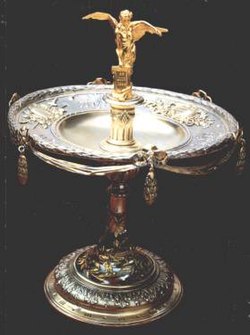
The Olympic Cup (French: Coupe olympique) is an award given annually by the International Olympic Committee.
Contents
It was instituted by Pierre de Coubertin in 1906 and is awarded to an institution or association with a record of merit and integrity in actively developing the Olympic Movement. [1]
Its recipients have included amateur sports clubs, schools, newspapers and national sporting administrations, though it is primarily awarded to groups connected with the organization of the Olympic Games.